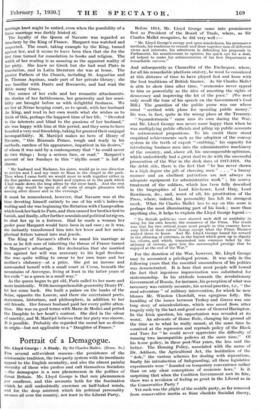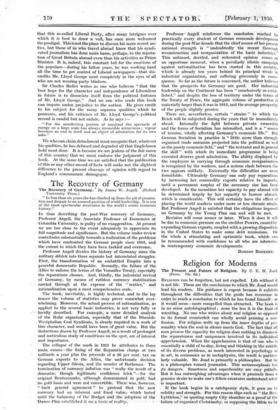Portrait of a Demagogue.
Mr. Lloyd George : A Study. By Sir Charles Mallet. (Berm. 9s.) Fox several self-evident reasons—the persistence of the aristocratic tradition, the two-party system with its inordinate appeal to the English mentality, and also the almost painful sincerity of those who profess and call themselves Socialists —the demagogue is a rare phenomenon in the politics of Great Britain. Mr. Lloyd George is that rare, phenomenon par excellence, and this accounts both for the fascination which he still undoubtedly exercises on half-baked minds, and for the deep mistrust which his political perionality arouses all over the country, not least in the Liberal Party.
Before 1914, Mr. Lloyd George came into prominence first as President of the Board of Trade, where, as Sir Charles Mallet recognizes, he did very well :-
" Mr. Lloyd George's energy and open-mindedness, his persuasive methods, his readiness to consult and draw together men of different views and interests, his adroitness in defending hia proposals in Parliament, his sensitiveness to opinion, his quick eye for a deal, all helped to make his administration of his first Department a remarkable success."
And subsequently as Chancellor of the Exchequer, where, for all his xemark.able platform oratory, he must be considered at this distance of time to have played fast and loose with the best traditions of British finance. As Sir. Charles Mallet is able to show time after time, " economics never appeal to him so powerfully as the idea of asserting the rights of democracy and improving the lot of the poor." (We need only recall the tone of his speech on the Government's Coal Bill.) The guardian of the public purse was one whose mind " seethed with plans for spending public money." Ile was, in fact, quite in the wrong place at the Treasury.
Squandermania " came into its own during the War, and Mr. Lloyd George was never more happy than when he was multiplying public officials and piling up public accounts to astronomical proportions. To his credit there stand empirical achievements such as the adoption of the convoy system in the teeth of expert " crabbing," his capacity for introducing business men into the administrative machinery of the country, and, above all, his unconquerable optimism, which undoubtedly had a great deal to do with the successful prosecution of the War in the dark days of 1917-1918. On the debit, side, there is the fact that " he has never shown in a high degree the gift of choosing men " . . . " a breezy manner and an ebullient patriotism are not always an adequate equipment for administrative work " ; his scurvy treatment of the soldiers, which has been fully described in the biographies of Lord Kitchener, Lord Haig, Lord Rawlinson, &c., and, worst of all, his prostitution of the Press, where, indeed, his personality has left its strongest mark. What Sir Charles Mallet has to say on this score is perhaps the most illuminating part of his book ; more than anything else, it helps to explain the Lloyd George legend :-
" No British politician ever showed such skill or assiduity in using for his own benefit the resources of the Press. The result was that for two critical years most people in this country know very little of their rulers' doings except what the Prime Minister wished them to know. And Mr. Lloyd George found his reward in the silencing of criticism, in the legend which grew up to dignify his efforts, and which, transmuted into common belief by the alchemy of victory, gave him the unexampled prestige that ho enjoyed at the end of the War."
For the duration of the War, however, Mr. Lloyd George may be accounted a privileged person. It was only in the .following years that the essential unsoundness of his politics was demonstrated. It is here that most people will bewail the fact that ingenious improvization was substituted for statesmanship. In his attitude towards the revolutionary Government of Russia, for instance, his perception of what was necessary was entirely accurate, his actual practice, i.e., " the mad adventure " of military intervention, for which he now blames Mr. Winston Churchill, was egregious folly. His handling of the issues between Turkey and Greece was one long story of miscalculations, which was saved from utter tragedy only by the tact and good sense of General Harington. In the Irish question, his opportunism was revealed at its worst. An advocate of Home Rule, changing his ground all the 'time as to what he really meant, at the same time he connived at the repression and reprisals policy of the Black and Tans for " he could never appreciate the difficulty of running two incompatible policies at the same time." Of his home policy, in these post-War years, the less Said the better. The Housing POlicy, associated with the name of
Dr. Addison, the Agricultural Act, the Institution of the . .
" dole," the various schemes for dealing with reparations, finally his intrOduction of Safeguarding, all these legislative experiments were " founded on temporary convenience rather than on any clear conceptions of economic laws." Is it surprising that when the Coalition Government met its fate, there was a revulsion of feeling as great in the Liberal as in the Conservative Party ? Yet such was the plight of the middle party, as far removed
from conservative inertia as from obsolete Socialist theory,
that this so-called Liberal Party; after many intrigues over - which' it is best to draw a veil, has once more welcomed the prodigal. This is not the place to discuss his more recent an- tics, but those of us who travel abroad know that his syndi- cated jOurnalisin has done more harm, perhaps, to the reputa- tion of Great Britain abroad even than his activities as Prime Minister. It • is, indeed, this constant bid for the 'emotions of the populace--during his fallow years, he was working hard all the time to get control of Liberal newspapers---that dis- credits Mr. Lloyd George most completely hi the eyes of all who are not wearing party blinkers.
Sir Charles Mallet writes as one who believes "that the best hope for the character and independence of Liberalism in future is to dissociate itself from the political fortunes of Mr. Lloyd George." And no one who reads this book can impute undue prejudice to the author.- He gives credit to his subject • for the many supreme qualities which he possesses, and his criticism of Mr. Lloyd George's political record is candid but not unfair. As he says :- " For the unreflecting portion of mankind the spectacle of energy on a large scale has always irresistible attractions ; vigour becomes an end in itself and an object of admiration for its own 'sake." '
We who can claim detachment must recognize that, whatever his qualities, he has debased and degraded all that Englishmen hold most dear. It is because we are jealous of the fair name of this country that we must endorse the judgment of this book. At the same time we are satisfied that the pUbliCation Of this or any other record of facts will make not the slightest difference to the present cleavage of opinion with regard to England's consummate demagogue.







































 Previous page
Previous page